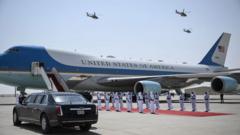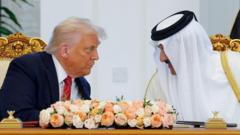The recent table tennis world championships in Qatar have unveiled a deeper struggle for power, as a wealthy businessman pursues leadership of the sport's international federation, drawing allegations of misconduct and repression of critics.
Qatar's Table Tennis Ambitions Spark International Controversy

Qatar's Table Tennis Ambitions Spark International Controversy
A push by a Qatari magnate to lead the global table tennis governing body has ignited scrutiny amidst allegations and a crackdown on dissent.
Article:
In a sparsely attended venue on the outskirts of Doha, Qatar recently hosted the table tennis world championships, an event that shone a spotlight on the nation’s ambitions within the sport, even as local interest remains minimal. Amidst the excitement of fierce competition, a more troubling narrative emerged: a wealthy Qatari businessman’s efforts to take control of the International Table Tennis Federation (ITTF) have raised serious concerns and attracted international scrutiny.
Although table tennis is often considered a casual pastime in some regions, it boasts immense global popularity and is particularly commercially viable in East Asia. Interviews with current and former officials, as well as players, indicate a pattern of aggressive financial strategies by Gulf nations like Qatar to gain influence in various sports. Critics have voiced alarm over a history marred by allegations of bribery and excessive spending linked to Qatari officials.
Adding to this troubling situation, on the opening day of the championships, a notable Swiss whistle-blower, Georg Silberschmidt, found himself embroiled in controversy. The ex-official from Swiss Table Tennis was detained by over twenty security personnel after distributing pamphlets promoting a new players' union intended to enhance rights for athletes. This incident underscores the increasingly precarious atmosphere surrounding allegations of governmental interference and suppression of dissent against the backdrop of Qatar's push for dominance in international sports.
In a sparsely attended venue on the outskirts of Doha, Qatar recently hosted the table tennis world championships, an event that shone a spotlight on the nation’s ambitions within the sport, even as local interest remains minimal. Amidst the excitement of fierce competition, a more troubling narrative emerged: a wealthy Qatari businessman’s efforts to take control of the International Table Tennis Federation (ITTF) have raised serious concerns and attracted international scrutiny.
Although table tennis is often considered a casual pastime in some regions, it boasts immense global popularity and is particularly commercially viable in East Asia. Interviews with current and former officials, as well as players, indicate a pattern of aggressive financial strategies by Gulf nations like Qatar to gain influence in various sports. Critics have voiced alarm over a history marred by allegations of bribery and excessive spending linked to Qatari officials.
Adding to this troubling situation, on the opening day of the championships, a notable Swiss whistle-blower, Georg Silberschmidt, found himself embroiled in controversy. The ex-official from Swiss Table Tennis was detained by over twenty security personnel after distributing pamphlets promoting a new players' union intended to enhance rights for athletes. This incident underscores the increasingly precarious atmosphere surrounding allegations of governmental interference and suppression of dissent against the backdrop of Qatar's push for dominance in international sports.






















